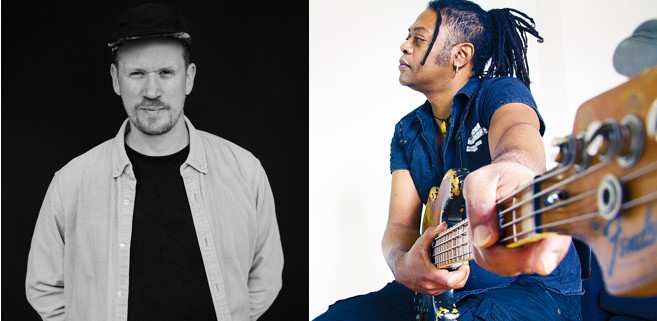Music is good for you
An inspiring overview of early childhood music education, from the first Swiss music daycare center to educational concerts. Report from the Lucerne conference "Learning music from an early age".

How must educational experiences be designed so that children's individual potential can unfold? This is the core question of any educational endeavor, and it was also the core question of the lectures and workshops at the Lucerne symposium Learning music from an early age. Over a hundred instrumental teachers came to expand their knowledge, to get ideas for their daily work or to finally hear how best to work with very young children. Almost all of them - and this was discussed controversially during the coffee breaks - identified deficits in their professional training in this area.
After "jumping into the deep end" of teaching, many of the participating instrumentalists felt the need to deepen their pedagogical knowledge. In contrast to various CAS courses at Swiss universities, the Lucerne conference offered a concentrated, yet extremely broad and time-limited range of approaches, topics and case studies on early childhood music education with lectures and workshops.
The first task was to reflect on the current teaching situation. The Lucerne host Walter Hess noted that children today spend significantly more time in daycare centers than in small families. To what extent this means that there is still room for early childhood instrumental lessons at all or whether instrumental teachers should instead find their way into daycare centers and schools remained an open question.
Babbling ...
Even toddler caregivers can encourage children's natural interest through a conscious approach to music, as Stefanie Stadler Elmer from the Institute of Psychology at the University of Zurich explained. She showed how closely language development and learning to sing are linked. During the first year of life, the two are indistinguishable; the child's vocalization - the typical baby babble - sometimes tends more towards imitation of syllables, sometimes more towards intonation of different pitches and melodic connections. It is not until the second year of life that the child learns to distinguish between the two modalities, whereby imitating melodies is much easier than imitating syllables. The regularity of singing is much more in line with the natural perceptual and production abilities of infants and toddlers. Daycare centers should therefore offer their children a wide range of listening activities and incorporate voice, motor and sensory skills in equal measure. According to Stadler Elmer, even a one-day training course could result in educators becoming much more aware of the songs and musical rituals that can usually already be found in daycare centers. She has made concrete suggestions in her book Child and music which will be published in 2014.
... romp ...
Movement scientist Renate Zimmer emphasized how fundamental it is for children to find access to music through their own bodies. Her book Romping around makes you smart! alludes to the theory repeatedly expressed in the media that music makes you smart. Zimmer used numerous images to show that both stimulate the formation of synapses in children - and thus, to put it casually, make them "smart". Zimmer referred to anthropology, which sees humans as beings who are designed for movement and experience and who require the use of all their senses in order to form an image of the world and themselves. For children, this means that education must be an active process in which the child experiences its own self-efficacy. Self-will and stubbornness shape the child's basic attitude; both must be encouraged and challenged in the educational process. For example, a child should be able to find out for themselves whether they can hit the table with a peach just as sonorously as with a rattle. It is the intensive experience of all the senses that makes for effective learning. Zimmer did not deny that this also requires guidance from adults - after all, education is also a social process. However, awareness of the circumstances is fundamental. She recommended that the instrumental teachers present should not answer the frequently asked question about their profession with: "I teach violin." But rather: "I teach children."
... and play
Madeleine Zulauf from the Musique Recherche Zulauf formation showed how instrumental lessons can be enriched in concrete terms. She noted that the pedagogical use of playing is very widespread in kindergarten, but is hardly ever found in early childhood instrumental lessons in the sixth and seventh years. Even the youngest children learn traditionally how to reproduce given music. The didactics focus strongly on imitation and repetition and neglect the development of skills to develop their own musical language. This is where playful improvisation could be integrated into instrumental lessons. Zulauf showed examples in which young children are encouraged to musically accompany a picture book story with the instrument of their choice. It is important for the child to be provided with different instruments or sound generators and for the adults to appreciate the musical production. Instrumental teachers can then accompany these lessons by recording, listening and self-analysis by the child; they can introduce musical terms on the basis of the improvisation and encourage notation of the improvisation.
Improvisation was also used again and again in the subsequent workshops: be it as a rhythm game in the workshop Interactions of elementary musical experiences through movement in rhythmics by Sabine Hirtler from the Technical University of Kaiserslautern, be it as a musical response to a Ligeti piece in the workshop Between concert and education project: educational concert events with children, young people and a young audience with Barbara Stiller from the University of the Arts Bremen. Andrea Holzer-Rhomberg presented her string school Fiddle Max in which playing with magic sounds, the spirit of the bow and journeys to ear-tip land are elements of holistic learning, and Susan Young from the University of Exeter drew attention to the diverse everyday musical experiences and activities of children.
In the concluding panel discussion, the question was asked how parents could be persuaded to make music in early childhood. In addition to all the scientific studies that have now proven the benefits, Aron Braun, Managing Director of Musikalische KiTa Zimballothe first and so far only music daycare center in Switzerland, explains the reason for his commitment: "Because music is good for you."








